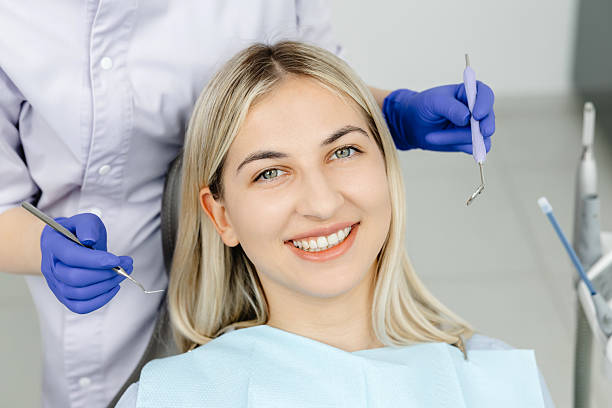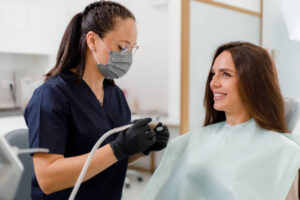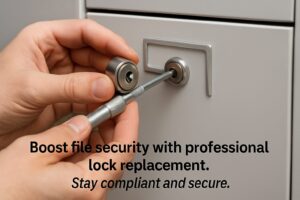
Dentist wearing blue gloves performing dental checkup on smiling blond woman in dental clinic
A Healthy Smile Starts with Regular Dental Prophylaxis
Oral health is more than just avoiding cavities. It’s about keeping your entire mouth in good condition. One of the most effective ways to maintain that health is through dental prophylaxis. This professional cleaning removes buildup that brushing and flossing miss. If left untreated, plaque and tartar can lead to gum disease and serious dental problems. Many patients think daily hygiene is enough. However, regular cleanings are a core part of preventive dentistry. They protect your teeth and gums and help avoid more serious issues. This guide breaks down what prophylaxis is and why it matters.
What Is Dental Prophylaxis?
Dental prophylaxis is a preventive procedure performed by a dentist or hygienist. It includes a thorough cleaning of the teeth and gums. The goal is to remove plaque, tartar, and stains. Even with daily brushing, buildup occurs in hard-to-reach places. Over time, this buildup can lead to decay or gum inflammation.
The cleaning involves scaling, which removes hardened tartar above and below the gumline. Then, polishing smooths the tooth surface, making it harder for plaque to stick. This routine helps keep your mouth clean, fresh, and disease-free. It’s one of the simplest forms of preventative dental care.
Why Regular Cleanings Are So Important
Skipping cleanings allows plaque to harden into tartar, which can’t be removed at home. This tartar creates the perfect environment for bacteria to thrive. As a result, you may develop gingivitis, which is early-stage gum disease. Without care, this can progress to periodontitis, a serious condition that can lead to tooth loss. Dental hygiene interrupts this process. Regular cleanings keep gum tissues healthy and reduce your risk of future problems. These cleanings also support fresh breath, a bright smile, and better overall health. Regular visits protect both your mouth and your wallet.
The Role of Preventive Dentistry
Preventive dentistry focuses on avoiding dental issues before they begin. Instead of treating disease, it aims to stop it early. This saves patients time, money, and discomfort. Prophylaxis plays a key role in that effort. It complements daily brushing and flossing by targeting what those habits miss. Cleanings also give dental teams the chance to spot early signs of decay, gum disease, or other issues. This helps you act fast before problems worsen. Prevention is easier and less expensive than treatment. That’s why cleanings are a routine part of any dental care plan.
What to Expect During a Dental Prophylaxis Appointment
A typical dental prophylaxis session begins with an exam. The dentist checks your mouth for signs of disease, decay, or other concerns. Then, a hygienist uses special tools to remove tartar and plaque from all tooth surfaces. Next, they polish your teeth using a high-powered brush and gritty toothpaste. This step removes stains and smooths the enamel. Some visits may include fluoride treatment for added protection. The entire process usually takes under an hour. It’s quick, painless, and extremely effective. Plus, it leaves your mouth feeling cleaner than brushing ever could.
Who Needs Dental Prophylaxis?
The short answer is everyone. From children to seniors, regular dental prophylaxis is essential. Kids are prone to cavities, especially while learning to brush correctly. Adults face risks from diet, stress, and other factors that affect oral health. Older adults may have gum recession, making them more vulnerable to disease. Cleanings are also important for people with braces, implants, or crowns. These devices create areas where food and bacteria can gather. Preventive care keeps things in check. Even if your mouth feels healthy, regular cleanings are still necessary.
How Often Should You Schedule a Cleaning?
Most people should get a dental cleaning every six months. However, your dentist might suggest more frequent cleanings based on your specific needs. People with gum disease, diabetes, or weak immune systems may need cleanings every three to four months. If you’re a smoker or have a history of dental issues, your schedule may also change. Consistency is the key. Delaying visits allows plaque and tartar to build up. The more time between cleanings, the more damage can occur. Sticking to your cleaning schedule is one of the best habits you can build.
The Cost Savings of Preventive Care
Many patients avoid cleanings because they’re worried about cost. Ironically, this decision usually ends up costing more. Ignoring your cleanings can lead to fillings, root canals, or even extraction procedures that are far more expensive. On the other hand, preventative dentistry is cost effective. Most dental insurance plans cover cleanings in full or at a low out of pocket cost. If you don’t have insurance, many clinics offer affordable care plans. Investing in prevention now helps you avoid painful and costly treatment later. It’s a smart move for your health and your finances.
How Dental Prophylaxis Supports Overall Health
Your mouth is connected to the rest of your body. Infections and inflammation in your gums can increase your risk of heart disease, stroke, and diabetes complications. Gum disease has also been linked to premature birth in pregnant women. By getting routine prophylactic dentistry, you reduce the bacteria that trigger these health issues. You also give your provider the chance to catch early signs of problems. Good oral health supports a strong immune system, better digestion, and higher self confidence. The benefits go far beyond your smile.
Prophylaxis for Kids and Teens
Early care sets the stage for lifelong oral health. That’s why dental hygiene is just as important for children and teenagers. Kids often struggle with brushing and flossing effectively. Cleanings remove what they miss and teach them healthy habits. Teens may experience hormonal changes that increase their risk for gum inflammation. Regular cleanings help manage this risk and protect developing teeth. Starting care young makes a big difference. It builds confidence, reduces fear of the dentist, and prevents serious problems later in life.
Conclusion
Your smile is worth protecting. Regular cleanings, good home care, and routine checkups all play a role. But few steps are as important as dental prophylaxis. It removes buildup, prevents disease, and supports lifelong health. Alongside preventive dentistry, it forms a complete care plan that keeps you ahead of problems instead of reacting to them. Make your next cleaning a priority. Your future self will thank you for it.







